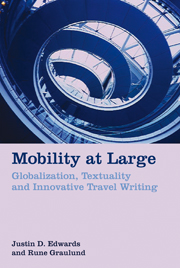Book contents
- Frontmatter
- Contents
- Acknowledgements
- Introduction: Travel Revisited
- 1 Travelling with the Ondaatje Bros.
- 2 Amitav Ghosh and Caryl Phillips: Global Travel, Then and Now
- 3 Unhomely Travels; or, the Haunts of Daphne Marlatt and W. G. Sebald
- 4 The World, My City: Home Grounds and Global Cities
- 5 Travel Histories – From Kuala Lumpur to Istanbul and Beyond
- Postscript: Still Mobile
- Bibliography
- Index
4 - The World, My City: Home Grounds and Global Cities
- Frontmatter
- Contents
- Acknowledgements
- Introduction: Travel Revisited
- 1 Travelling with the Ondaatje Bros.
- 2 Amitav Ghosh and Caryl Phillips: Global Travel, Then and Now
- 3 Unhomely Travels; or, the Haunts of Daphne Marlatt and W. G. Sebald
- 4 The World, My City: Home Grounds and Global Cities
- 5 Travel Histories – From Kuala Lumpur to Istanbul and Beyond
- Postscript: Still Mobile
- Bibliography
- Index
Summary
All of us are, willy-nilly, by desire or by default, on the move. We are on the move even if, physically, we stay put: immobility is not a realistic option in a world of constant change… We are all in travel, whether we like it or not.
Zygmunt Bauman, Globalization 2Yesterday the colonial difference was out there, away from the center. Today it is all over, in the peripheries of the center and in the centers of the periphery.
Walter Mignolo, Local Histories/Global Designs ixIn postcolonial studies, the European colonial project is sometimes described as a powerful form of cultural mobility that travels from a metropolitan centre to a colonial periphery, an uneven exchange in which the metropolitan (European) centre exploits its provinces. Likewise, the political and cultural projects of decolonization are often described as a reversal of this movement: a ‘writing back’ from the periphery to the centre in order to highlight the inequities of imperial power and emphasize regional and ontological ‘differences from the assumptions of the imperial center’ to assert the cultural rehabilitation of the periphery (Ashcroft, Griffith and Tiffin 2). But while the twentieth century is, at times, defined as the century of decolonization, the political independence of former European colonies did not necessarily challenge the asymmetrical power relations (particularly cultural and economic discrepancies) between imperial urban centres such as London and Paris and the former colonies of Europe.
- Type
- Chapter
- Information
- Mobility at LargeGlobalization, Textuality and Innovative Travel Writing, pp. 122 - 164Publisher: Liverpool University PressPrint publication year: 2012

